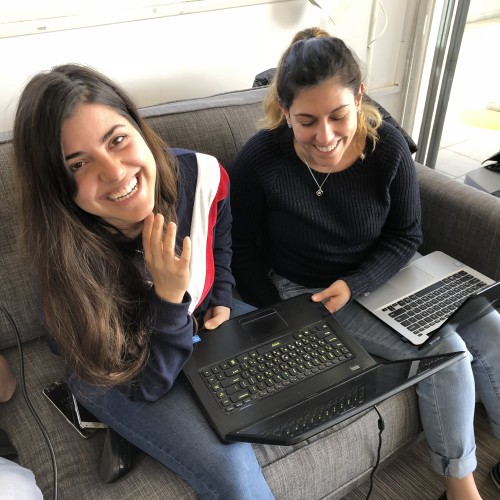
Before you start, I suggest you read this little e-book. First meetings and initial interviews are key. You don’t want to mess up an opportunity to be amazing!
2
3
Oh, and this one too. Learning to networking is so important.
4
5
In my opinion, much of undergraduate college (or university) studies is a waste of time. If you’re lucky, some 20 to 40 percent of your studies will be fun, challenging, and intriguing. Those are the courses you have to concentrate on. (But do keep in mind that anything you learn can come in handy [see tip six]).
6
So my first tip is delve into the courses that you LOVE. Read the supplementary material and more. Ask questions in class. Get to know the lecturer. Ask her/him whether you can intern during the summer. Think of how the course and subject can impact other areas that you’re interested in. There were only a handful of courses at university that I loved. They changed my career and helped make me who I am!
7
My second tip is to get the grades that you NEED. Not more. Grades are secondary to being amazing. If you need a certain grade average to get into graduate school, there is no point in trying to get 100. It’s better to try to excel in other areas (see further).
8
Tip number three: Get involved in non-academic activities at your college or university. Debating club, drama improv, students’ union, sports, social and philanthropic societies. You’ll learn a lot more than in the stuffy classroom. And you may make great friends that will stay with you forever (or at least long after you’ve forgotten every equation you ever had to remember by heart).
9
Tip number four: Practice your oral presentation skills. Be the one to volunteer to present in class, even if you are nervous. Especially if you are nervous. Being able to express yourself in front of other people will help you throughout your personal and professional life. Here are my ten tips for oral presentations.
10
11
Tip five: Cultivate your listening skills. Good conversationalists turn out to be people who listen more than they speak! If you don’t believe me, read Dale Carnegie’s classic, “How to win friends and influence people”. Jimmy Wales (the amazing guy behind Wikipedia) told me that his secret of success is his ability to listen. He’s the whale in my children’s book.
12
13
Tip six: Develop more than one skill and expertise. Computers and so-called robots are taking over single-minded jobs from human beings as we speak. Be double-minded (or even multi-minded). Have at least two separate professions (or areas of expertise) that you are good at. Connect them. This is where your amazing future lies.
14
Tip Seven: There is no such thing as useless knowledge. There are only people who do not know how to use what they have learned. Every time you learn something think of how it might be connected to other things you have learned or know. Even if they don’t appear to be connected. Especially if they don’t appear to be connected.
15
Tip Eight: “Think Between Boxes”. Innovative people don’t think ‘outside the box’ wherever that is supposed to be. They connect between ‘boxes’ in unanticipated ways. It’s one of the secrets of creative thinking, a critical skill in the modern world.
16
17
Tip nine: If you don’t have a good sense of humor, you’d better get one fast. Start with being able to smile and laugh at your own quirks and shortcomings (rather than making fun of others). Here is my brief manual, disguised as a children’s book.
18
19
Tip ten: Failing an exam is okay. Actually it’s fine. We learn a lot by dealing with failure and overcoming it. Better to practice with failed exams than with something more important. Like a failed marriage or career. I learned more from my (many) failures than from my (rarer) successes. Here’s the book.
20
21
Extra: If you’re a research student, then this book is for you as well.
22
23
Published: Feb 23, 2018
Latest Revision: Oct 17, 2018
Ourboox Unique Identifier: OB-436133
Copyright © 2018








